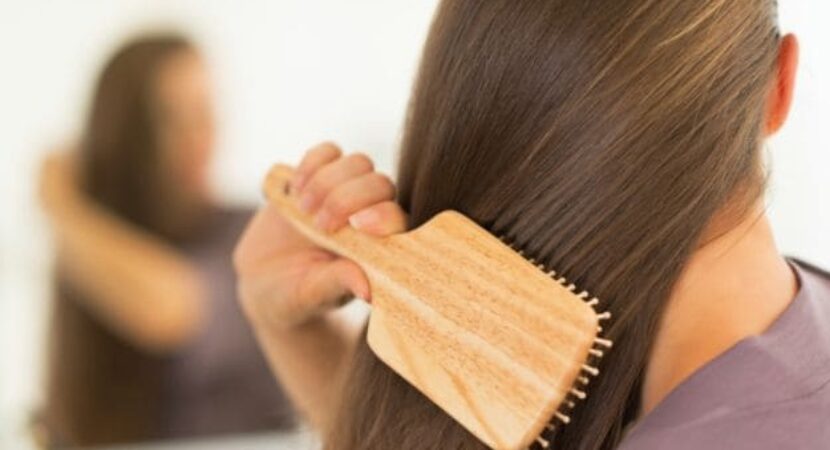Growing hair can be influenced by various factors, including genetics, overall health, and lifestyle. While there is no guaranteed instant solution to grow hair overnight, here are some tips and approaches that might help stimulate hair growth and improve hair health:
I. Healthy Diet:
Consume a balanced diet rich in vitamins, minerals, and protein. Foods high in biotin, vitamin E, vitamin A, and omega-3 fatty acids can promote hair health.
Maintaining a healthy diet can indeed contribute to promoting hair growth and overall hair health. Here are some essential nutrients and dietary recommendations that can support healthy hair growth:
- Protein: Hair is primarily composed of a protein called keratin. Ensuring an adequate intake of lean protein sources like lean meats, poultry, fish, eggs, beans, and legumes can provide the building blocks necessary for hair growth.
- Biotin: Biotin, a B-vitamin, is often associated with hair health. Foods rich in biotin include eggs, nuts (especially almonds), seeds, sweet potatoes, and leafy greens.
- Omega-3 Fatty Acids: These healthy fats are found in fatty fish (like salmon, mackerel, and sardines), flaxseeds, chia seeds, and walnuts. Omega-3 fatty acids contribute to scalp health and can help prevent dry, brittle hair.
- Vitamins A and C: These vitamins play a crucial role in producing sebum, the natural oil that conditions the scalp. Foods high in vitamin A include sweet potatoes, carrots, and spinach, while citrus fruits, strawberries, and bell peppers are rich in vitamin C.
- Iron: Iron deficiency can lead to hair loss. Incorporate iron-rich foods like lean meats, poultry, fish, lentils, beans, and fortified cereals into your diet.
- Zinc: Zinc helps maintain the health of hair follicles. Good sources of zinc include oysters, beef, nuts, seeds, and whole grains.
- Vitamin E: This antioxidant promotes blood circulation and helps the scalp maintain a healthy environment for hair growth. Nuts, seeds, spinach, and avocados are great sources of vitamin E.
- Silica: Silica contributes to hair strength and can be found in foods like whole grains, oats, and brown rice.
- Selenium: Selenium is essential for hair health and can be obtained from foods like brazil nuts, fish, eggs, and whole grains.
- Collagen: Collagen is a protein that can contribute to hair strength and elasticity. Bone broth and collagen supplements are potential sources.
Remember that a balanced diet is key to overall health, including hair health. It’s also important to stay hydrated, as dehydration can negatively impact hair growth.
While a healthy diet is a fundamental aspect of promoting hair growth, keep in mind that individual factors, genetics, and underlying health conditions can also influence hair growth. If you’re experiencing severe hair loss or other concerning symptoms, it’s recommended to consult a medical professional or dermatologist for personalized guidance and potential treatment options.
II. Stay Hydrated:
Staying hydrated is indeed essential for overall health, including hair health. While hydration alone might not directly cause hair growth, it plays a role in maintaining the health of your hair and scalp. Here’s how staying hydrated can contribute to healthy hair:
- Scalp Health: Dehydration can lead to a dry scalp, which can potentially affect the health of your hair follicles. A well-hydrated scalp provides a conducive environment for hair growth.
- Nutrient Transport: Water is essential for transporting nutrients and oxygen to cells, including those in your hair follicles. When your hair follicles receive adequate nutrients, it can support healthy hair growth.
- Hair Elasticity and Strength: Proper hydration can contribute to hair elasticity and strength, making your hair less prone to breakage.
- Natural Hair Oil Balance: Hydration helps regulate the production of natural scalp oils, called sebum. These oils moisturize the hair and scalp, preventing dryness and promoting a healthy environment for hair growth.
- Blood Circulation: Good hydration supports proper blood circulation, which in turn ensures that the hair follicles receive a sufficient supply of nutrients and oxygen.
Remember that while staying hydrated is important, it’s just one piece of the puzzle when it comes to promoting hair growth. A balanced diet rich in essential nutrients, proper hair care, and addressing any underlying health issues are equally crucial factors.
If you’re looking to enhance hair growth, consider combining staying hydrated with other healthy practices like a nutritious diet, proper hair care routine, stress management, and regular exercise. If you’re experiencing significant hair loss or other hair-related concerns, consulting a medical professional or dermatologist can provide you with personalized advice and recommendations.
III. Scalp Care:
A clean and healthy scalp is essential for hair growth. Regularly wash your hair and use a mild shampoo. Avoid over-washing as it can strip natural oils.
Proper scalp care is a pivotal element in fostering healthy hair growth. A well-maintained scalp provides an optimal environment for hair follicles to thrive. Regular cleansing helps remove dirt, excess oil, and product buildup that can clog follicles. Gentle massaging during washing stimulates blood flow, delivering essential nutrients to hair roots. Avoiding harsh chemicals and using a balanced shampoo can maintain the scalp’s natural pH balance. Furthermore, regular exfoliation and moisturizing can prevent dryness and flakiness. Nurturing your scalp with these practices encourages robust hair growth and contributes to overall hair health.
IV. Massage:
Gently massage your scalp to increase blood circulation and promote hair growth. You can use your fingers or a soft brush.
Scalp massage offers a simple yet effective approach to promoting hair growth. Gentle and regular massaging of the scalp stimulates blood circulation, enhancing the delivery of vital nutrients and oxygen to hair follicles. This increased circulation can revitalize dormant follicles and encourage healthy hair growth. Additionally, scalp massage helps reduce stress, which is known to contribute to hair loss. Whether using your fingertips, a massage brush, or essential oils, incorporating scalp massage into your routine can contribute to improved hair health and a rejuvenated scalp environment.
V. Avoid Heat and Chemicals:
Excessive heat styling and chemical treatments can damage hair follicles and hinder growth. Try to minimize the use of heat styling tools and harsh chemicals.
VI. Trim Regularly:
Trimming the ends of your hair regularly can prevent split ends and promote healthier growth.
VII. Use Hair-Friendly Products:
Use hair care products that are suitable for your hair type and needs. Look for products that are free from sulfates, parabens, and harsh chemicals.
VIII. Supplements:
Consult with a healthcare professional before taking any supplements for hair growth. Biotin, collagen, and specific vitamins might be recommended in some cases.
IX. Medical Conditions:
Certain medical conditions like hormonal imbalances, thyroid issues, or alopecia can affect hair growth. Consult a doctor if you suspect an underlying health issue.
X. Prescription Treatments:
For more severe hair loss, medical treatments like minoxidil (Rogaine) or finasteride (Propecia) might be prescribed by a healthcare professional.
XI. Lifestyle Choices:
Stress can contribute to hair loss. Engage in stress-reducing activities like yoga, meditation, or exercise.
XII. Avoid Tight Hairstyles:
Wearing tight hairstyles or using hair accessories that pull on the hair can lead to breakage and hair loss.
XIII. Patience:
Hair growth takes time, and results may not be immediate. Be patient and consistent with your efforts.
Remember that everyone’s hair is unique, and what works for one person might not work the same way for another. If you’re concerned about hair loss or slow growth, it’s a good idea to consult a dermatologist or healthcare professional to determine the underlying cause and receive personalized advice.


Reply